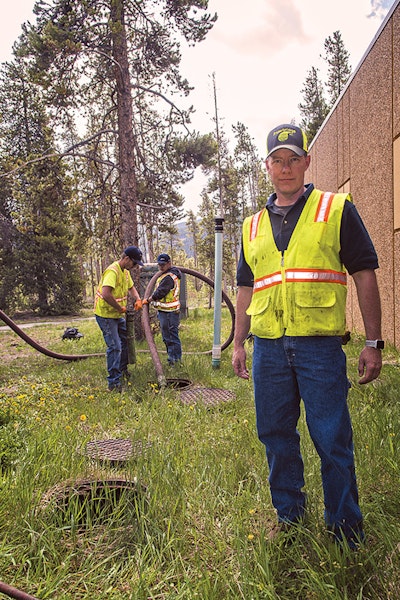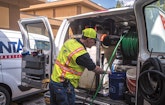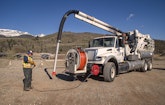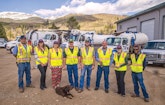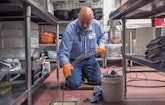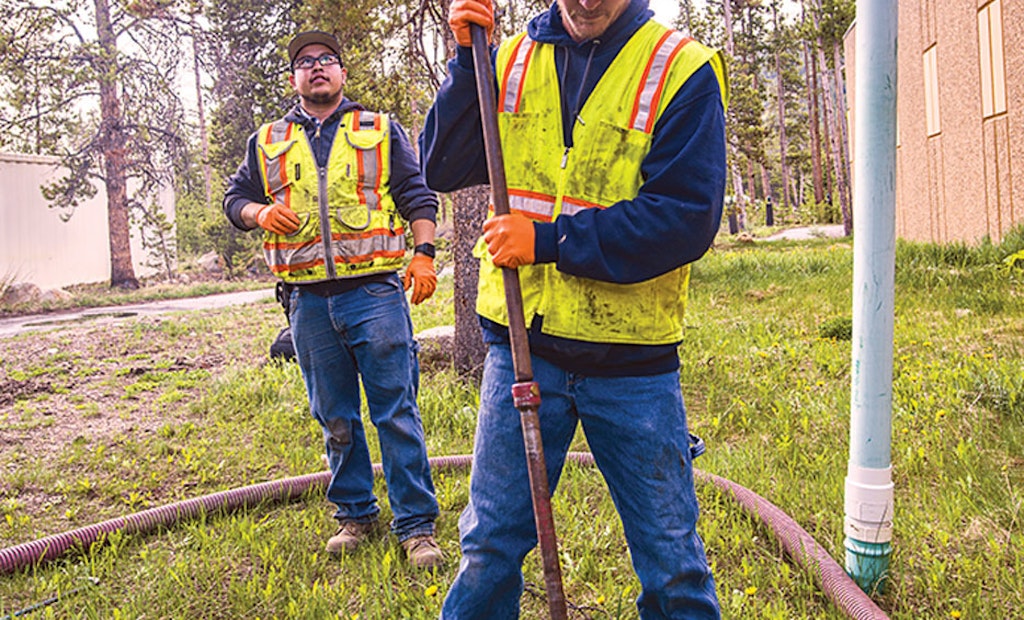
Bill Tatro III collects supplies from a van carrying 4,000 psi/9 gpm Brute jetter from Jetters Northwest and a COXREELS hose reel.
Imagine you’re a pumper in a territory with long winters and a short work season, a small permanent population that limits the year-round volume of work, and a base of septic system users being eroded by expanding municipal sewer systems.
Bill Tatro III and Chris Tatro faced that scenario with their onsite service business around home base in Breckenridge, Colorado, high in the Rocky Mountains. Their answer: diversify. Their company, Snowbridge Inc., maintains a strong septic system service and repair business but also performs sewer lateral construction, pipe cleaning and maintenance, pipe inspection, cured-in-place pipe lining, and hydroexcavation.
Their pipe services touch the residential, commercial and industrial sectors. Their two Roto-Rooter franchises serve five counties around Breckenridge, west of Denver in ski resort country. They do it all with an experienced 16-member team, which they retain with competitive pay and a complete benefit package.
“In the main counties we serve, the septic business is shrinking, and over time it’s going to shrink even more,” Bill Tatro says. “In the town where most of the septic systems are, the local sanitation district has been aggressive in extending sewer services. So we’re really trying to grow other areas of our business. We see a definite growth path in municipal and industrial services, and we want to expand our trenchless repair business as well.”
A LONG HISTORY
Snowbridge traces its history back to 1976, when Bill Tatro Jr. and wife, Cheryl, bought a vacuum truck with a Cusco tank on a Ford chassis and started a septic tank pumping business. “My dad was kicking around ideas to start a business,” Bill Tatro III says. “When the old guy who was pumping septic tanks here retired, my dad decided to do that.
“I started working for my dad during the summers when I was 13, in 1986. I worked for him in summer through high school and part of college.” He took a break from college for a couple of years and worked full time in the business in 1994-95. Then he went back to finish a degree with an agriculture major in animal science at Colorado State University.
He came back to the family business for two years after that, left for four years to work in heavy-equipment rental, and then came back for good in 2004. He and Chris Tatro, eight years younger, bought the business in January 2009. By that time, the septic service business was thriving and the Roto-Rooter franchises were well-established.
Everything operates from a single location in Breckenridge. The septic service business is focused on Summit County and Eagle County, about 80 and 100 miles west of Denver. In that large, but sparsely populated territory, the company pumps about 250 septic tanks a year. “Here in the central mountain region, we get a lot of snow,” Bill Tatro III says. “Our septic tank pumping season is basically May through October, and sometimes we can’t start in some places until June. It’s a pretty tight window to get all the tanks pumped.”
CHALLENGING GEOGRAPHY
Working in the mountains brings unique challenges. “Our office is at about 9,600 feet,” Tatro says. “In our service area, we have an operating floor at about 7,500 feet. We pump some tanks at ski areas that are at 11,000 to 12,000 feet. At these altitudes, the air is less dense, so vacuum pumps don’t work as efficiently as at sea level. So, when we buy pump trucks, we definitely oversize our vacuum pumps.”
The mountain topography is challenging, too “Quite often, we have steep lots where the tank is well downhill from where we can park the truck, so it’s a steep lift from the tank up to the truck. If it’s really steep with a lot of lift, we can be there for hours.” Sometimes they use an electric sewage pump to lift the wastewater; other times they deploy an electric pump and the truck-mounted pump in combination.
Then there are sites where the tank lies well above the truck. “We can pump those tanks at the speed of sound,” Tatro says. “You start pumping and you basically create a siphon. It pumps the tank in a few minutes.”
The pumping business also includes grease traps at restaurants and hotels in the resort areas, along with preventive maintenance and pipe cleaning for those establishments. The company pumps about 250 grease traps per year. Septage and grease are emptied from the trucks into a semitank trailer on the Snowbridge property; contractor McDonald Farms hauls the filled tanks away to its private treatment facility in Denver. “We have a couple of wastewater treatment plants where we can take septic waste if we need to,” Tatro says. “None of the treatment plants in this area will take grease trap waste.”
INSTALLATION SIDE
The company’s pumping competitors are mostly small, single operators, although a couple of larger companies also vie for the septic business. Snowbridge charges higher prices than competitors based on its full-service approach: “We offer a lot of services that our smaller competitors don’t. A lot of them are just pumpers; they may do some drain cleaning. We do everything from pumping the tank, to clearing the drains, repairing broken components and replacing whole systems.”
Most of the company’s onsite installation business revolves around repairs of existing systems. Crews replace about a dozen tanks per season and do three to four full system replacements. “We do hardly any new-construction installations,” Tatro says. “The systems we put in are pretty big, with sand filters or sand mounds, pumps and controls.”
In Summit County, homeowners are required to have a dosing mechanism — either an electric pump or a siphon. Most new systems have a pressure-dose component, so most of those have pumps. Most of the company’s drainfields use rock media. Where sites require aerobic treatment units, Snowbridge uses mainly AdvanTex systems (Orenco Systems), as well as some BioMicrobics units. For ATUs, the company provides maintenance agreements, which the county codes require as a condition of issuing an operating permit.
CASTING A WIDE NET
Snowbridge owners determined long ago that onsite treatment services alone did not make a sound business model. Tatro’s parents established the two Roto-Rooter franchise 30 years ago. The Roto-Rooter business and the Snowbridge septic services feed business to each other. “We may go out to a septic system for a drain call, and the tank might end up needing to be pumped,” Tatro says.
Other diversification happened gradually, by evolution. The company bought its first box-truck-mounted water jetter (Harben) in 1986 and served mainly commercial customers, often thawing frozen sewer pipes. Today the company owns:
- A truck-mounted 4,000 psi/25 gpm Rockstar jetter (US Jetting)
- A van-mounted, propane-fueled 4,000 psi/9 gpm Brute unit (Jetters Northwest)
- A trailer-mounted Harben 4,000 psi/10 gpm jetter.
Over time, the company started doing sewer line repairs after finding broken pipes on jobs. Next came CIPP lining in 2005; the company uses an LMK Technologies lining system.
For sewer lateral inspection, technicians use SeeSnake push cameras (RIDGID), often in tandem with that company’s NaviTrack locators. As work expanded to the municipal side and into larger pipes, “We had to increase the size of our equipment,” Tatro says. “So we bought a Rovver crawler camera (Envirosight) in 2014. The whole system is relatively small and mobile. We mounted it in a small cargo trailer, which we built to accommodate additional video screens, audio, and other equipment.
“Shortly after that, we saw that we couldn’t adequately clean the larger pipes with our jetters, so we bought a used Vactor combination truck. Now we can work on pipes from 1 inch all the way up to 36- and 48-inch culverts.”
The vacuum truck fleet includes two units built by House of Imports:
- 2006 International 8600 with 3,300-gallon waste and 400-gallon freshwater tanks and 520 cfm National Vacuum Equipment Challenger pump.
- 2006 Freightliner M2 with 2,200-gallon and 200-gallon freshwater tanks and 363 cfm National Vacuum Equipment Defender pump.
Snowbridge uses a Crust Busters tank agitator.
For excavation, Snowbridge uses a 2006 Cat 305 mini-excavator. “For the past five years or so, we have also leased a larger machine during the excavation season,” Tatro says.
Home base for all services is an 8,000-square-foot shop and office in Breckenridge, built in 2003. It has a heated garage for the vacuum trucks, jetters, and other large equipment, along with six offices. Most equipment maintenance is handled in-house.
DELIVERING QUALITY
Snowbridge builds its reputation on an excellent team led by Bill Tatro, managing the onsite side; Chris Tatro overseeing project work including municipal service and trenchless repairs; and Sam Dayton supervising the field crews. The other field team members are:
- Ever Leon, project supervisor focused on municipal service.
- John Beyer, senior service technician, drain cleaning specialist and trainer.
- Service technicians Mike Streicher, Todd Franzen, Phil Gudlewski, Danny Spiecher and Derrick Floyd.
Back at headquarters, Katie Tatro is office manager, Jan Losh handles administration and human resources, and Noah Gauss is director of business development, sales, and estimating.
Team members receive uniforms, health and dental insurance, a retirement plan, and paid vacations. “We have a good crew that has been in place for quite a few years now,” Bill Tatro says. “We’ve worked really hard to retain the people we have.”
The company makes its mark by leaving as few marks as possible on customers’ homes and properties: “When going into somebody’s house, we always use shoe covers (Shubee). We use carpet protectors when we have to walk through houses or bring jetter hoses inside. When pumping tanks, we try to be careful about driving into someone’s driveway so we’re not damaging the asphalt or the driveway edge.”
Recruiting new team members has been challenging in a locality with a strong economy and abundant jobs in the construction and service sectors. Tatro rarely finds applicants with direct pumping or drain cleaning experience, so he looks for people with mechanical skills. Failing that, he’s willing to take on people who have an interest in learning.
“Last year we hired Danny Spiecher, who had been a cook and didn’t have any experience in the mechanical world. We gave him a shot, and he has become a good drain technician. We sent him to the National Association of Wastewater Technicians Operation and Maintenance class, and he’s going to be our O&M technician for ATUs. He has really taken to it. He liked the change, and he’s doing well.”
ON A GROWTH TRACK
Meanwhile, Snowbridge is adapting to a market in which the septic service business is on a downward trend. “A few years ago, when the sanitation district started moving its services farther out, we made a conscious decision to start doing more repair work and excavating,” Tatro says. “If we’re going to lose the septic systems, then we’d like the chance to put the sewer lateral in. We install sewer lines to the municipal main where they’re replacing septic systems. We do about 10 sewer lines a summer, along with tank and system replacements.
“We’ve had to diversify all along the way because our area is pretty small. It’s resort-community-based, so we don’t have a large population of full-time residents. We have an oversized infrastructure to support the people who come and visit — the skiers and the mountain vacationers. But there has never been a lot of any one kind of work that we can do to make enough money year-round to keep the doors open. We’ve had to do a number of different things to stay busy.”
It’s a formula that certainly seems to be working.
Serving industry
As part of its diversification, Snowbridge Inc. is expanding into the industrial market. That includes pipe cleaning and maintenance at mines in its Rocky Mountain territory.
“We have some active molybdenum mines in the area,” says company co-owner Bill Tatro III. “We often go on site to clean their water transport and water reclamation pipes. One of the mines we serve is no longer active. It’s a huge reclamation property now and is treating water that is pumped out of the mine. The long transport pipes that carry water from the mine to the wastewater treatment plant become calcified over time from hard minerals in the water. We do a lot of cleaning of those pipes.”
Hydroexcavation is a growth area; the company’s Vactor combination truck does double duty potholing and daylighting for excavating contractors. “We also do projects of our own where we repair or install sewer lines and have to daylight for utilities,” Tatro says.
“We’ve got a budding hydroexcavation business. We don’t have any local competition for that work. Some contractors come up from Denver and compete with us, but there are none based nearby. We do a decent amount of hydroexcavation for municipalities and some of the bigger contractors. We will probably have to purchase a true hydrovac truck this year.”
